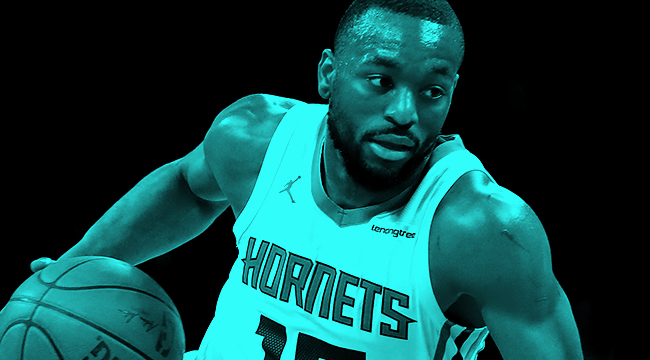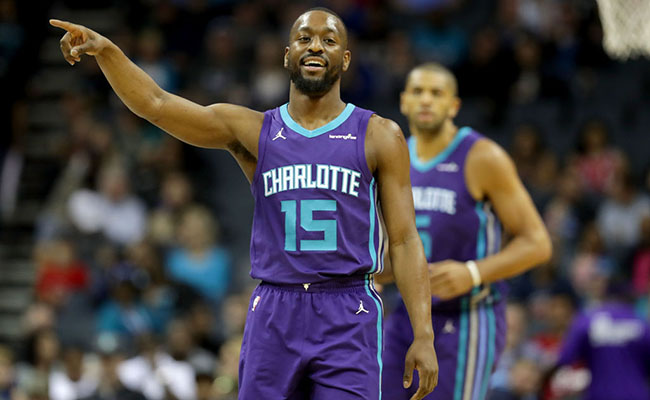
CHARLOTTE — On Wednesday night, the Cleveland Cavaliers beat the Charlotte Hornets, giving the Hornets their 42nd loss in what has been a lost season. If a fan were to focus just on the outcome, they’d gloss over the most poignant moment of the game, which came when Kemba Walker shook off a bad night for the first 45 minutes of action and went on a scoring barrage to claim the Hornets’ franchise record for points scored.
With 20 seconds left in an already decided game, Walker drove to the basket and laid the ball in to an eruption of cheers from the home crowd, who knew they’d witnessed something special. The interesting thing is, anyone who followed the team since Walker was drafted never saw any of this coming.
Walker’s first two seasons were filled with internal turmoil, none of it his doing. The team stripped the roster down to nothing in his rookie year as the then-Bobcats set an NBA record for team futility by having the worst winning percentage in league history after a 7-59 season. Walker’s second season showed improvement on the court, but while that was happening, Bobcats coach Mike Dunlap couldn’t stop clashing with people in the organization.
It wasn’t until Walker’s third season in which some semblance of a functional team was built around him. Al Jefferson was signed as a message to the fan base that the front office was tired of losing and it was time to make a playoff run. Walker and Jefferson held together a cast of NBA vagabonds, and along with first-time head coach Steve Clifford, Charlotte went 43-39 and made the postseason. They found themselves going up against the LeBron James-led Miami Heat in the first round, which dispatched the Bobcats in four quick games and sent Charlotte scrambling back to the drawing board.
Basketball fans around Charlotte didn’t get how special Walker could be until 2014, when the Hornets name came back. In their first game with familiar colors, Charlotte erased a 20-point lead to the Milwaukee Bucks in their season opener. Walker not only hit the three-pointer to send the game to overtime, but hit the game-winning shot in the final moments.
Walker’s heroics weren’t done that season, as he sent Carmelo Anthony and Amar’e Stoudemire’s Knicks home with a loss on a buzzer-beating layup a month later. Those two moments were high points in what was another lost season for Walker, who has played a whole lot of brilliant basketball for teams that haven’t made it to the postseason during his career.

To Charlotte fans, that’s why Walker is revered. He possesses the ability to make people believe that, on any given night, he will find a way to pick up a win. Whether it’s an ankle-breaking crossover that gives him space for a pretty fadeaway from mid-range that touches nothing but nylon, or a drive to the rim that features him finishing among the trees, Hornets fans are never cheated when Kemba Walker is on the floor.
For the first four years of his career, Walker was a sub-35 percent shooter from deep. Then he started working on his jumper. Walker first worked with legendary NBA sharpshooter Mark Price. When Price left for another job, Walker received guidance from Bruce Kruetzer. The end result was that defenders now had to respect his jumper, which made the already-dangerous Walker an even tougher defensive assignment.
The rapid improvement over the last three years is what made the trade rumors in January that featured Walker aggravating. After all these years of futility, fans finally had a player to attach themselves to, a player respected around the league for what he’s done in Charlotte. Yet to improve the team, fans would have to lose the greatest player in the franchise’s relatively short history. That’s the kind of thought process that would strain the faith of a fan base burned by lottery balls and the promise of young players.
Walker’s late-game scoring flurry on Wednesday turned a 13-point loss into a coronation. No longer would there be a debate about the best player to play for any version of the Hornets. Fans in Charlotte, drunk on nostalgia, could no longer utter the names of players long since gone like Larry Johnson, Alonzo Mourning or Glen Rice. All they need to do is turn on the local cable channel and watch Walker go to work.
The best part of Wednesday night wasn’t even the layup that put Walker atop the record books, it’s what came after the final horn had sounded. While the diminutive Walker was embracing James, a decent portion of the crowd stuck around to give him a standing ovation for his accomplishment. This mirrored the ending of the first NBA game ever played by the Charlotte Hornets nearly 30 years ago, in which they were on the wrong end of 30-point beatdown to, you guessed it, the Cleveland Cavaliers. On that night, the Charlotte fans treated the Hornets’ players to a standing ovation.
As things came full circle, Walker spoke with sideline reporter Stephanie Ready, a towel by his face to hide the tears as he described the emotions of owning a piece of franchise history. He had just became the king of the NBA in Charlotte, and fans will remain hopeful that his reign will last for the duration of his NBA career.






